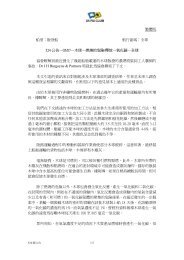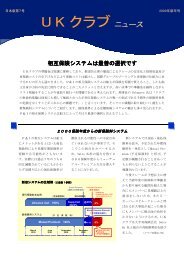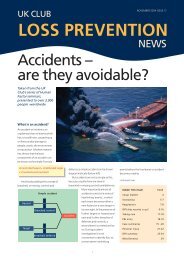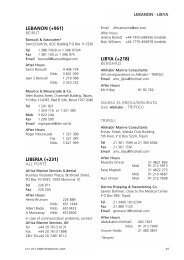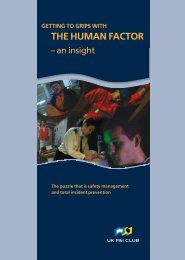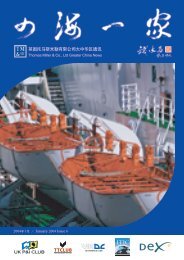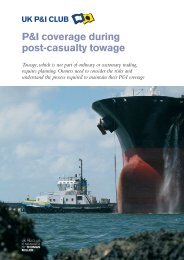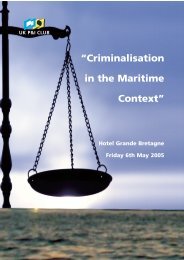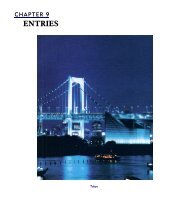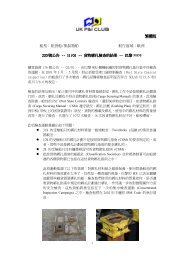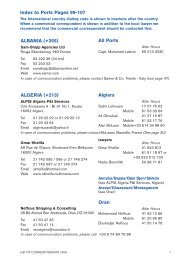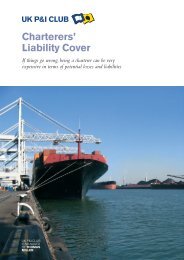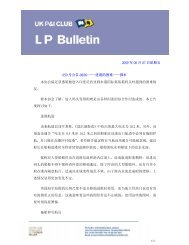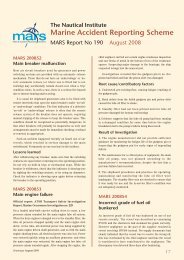Port State Control A/W - UK P&I Members Area
Port State Control A/W - UK P&I Members Area
Port State Control A/W - UK P&I Members Area
- No tags were found...
Create successful ePaper yourself
Turn your PDF publications into a flip-book with our unique Google optimized e-Paper software.
ASIA PACIFIC MEMORANDUM OF UNDERSTANDING(TOKYO MOU)FIRST INSPECTIONUnder the Tokyo MOU <strong>Port</strong> <strong>State</strong> <strong>Control</strong> is carried out byinspectors acting under the responsibility of the participatingMaritime Authority to whom they report. The professionalrequirements and training of the surveyors are not so extensivelyset out as in the Paris MOU, simply stating at Clause 3.5 that“Inspections will be carried out by properly qualified persons....”.However, after more than two years of preparations, the TokyoPSC Manual has recently been published for use by inspectorsin the region. The manual is intended to provide guidance andinformation that will assist the inspectors in carrying out theirduties in a harmonised manner.PORT STATE INSPECTIONS CARRIED OUT BYINDIVIDUAL PARTICIPATING MEMBERSAUTHORITY NO. OF NO. OF NO. OF NO. OFINSPECTIONS SHIPS WITH DEFICIENCIES DETENTIONSDEFICIENCIESAUSTRALIA 2901 1976 13638 248CANADA 389 246 1263 51CHINA 1229 724 4048 32FIJI 0 0 0 0HONG KONG 250 232 3039 140INDONESIA 1862 559 1229 0JAPAN 3111 1204 3342 88REPUBLIC OF KOREA 749 291 1700 48believing that the condition of a ship or its equipment or its crewdoes not substantially meet the requirements of a relevantinstrument, a more detailed inspection will be carried out. Inaddition, the inspectors conduct an inspection of several areason board, to verify that the overall condition of the ship(including the engine room and accommodation, and includinghygienic conditions, tests, drills, musters etc) complies with thestandards required by various certificates. The Tokyo MOUsets out general inspection criteria in Annex 1, and alsospecifically references and incorporates the ILO 147 and theILO publication “Inspection of Labour Conditions on boardShip: Guidelines for Procedure”.In addition to the above, the document informs us that anyparticipating member will, when requested to do so by anotherparticipating member, endeavour to secure evidence relating tosuspected violations of the requirements on operational mattersof Rule 10 of COLREG 72 and MARPOL 73/78.SHIP SELECTION CRITERIAThe participating members of the Tokyo MOU seek to avoidinspecting ships which have been inspected by any otherparticipating member within the previous six months, unlessthey have clear grounds for inspection or they fall into thecategories of ships listed at Clause 3.3 to which they are asked topay special attention to, namely:MALAYSIA 47 27 158 4NEW ZEALAND 1153 418 1414 9PAPUA NEW GUINEA 3 3 40 1RUSSIAN FEDERATION 349 160 1249 54SINGAPORE 198 80 480 14THAILAND 2 0 0 0VANATU 0 0 0 0TOTAL 12243 5920 31600 689Source: Annual Report of the Tokyo MOU 1996, published September 1997Inspections are generally unannounced and usually begin withverification of certificates and documents. When deficienciesare found or the ship is reportedly not complying withregulations, a more detailed inspection may be carried out. As●●●●●passenger ships, roll-on/roll-off ships and bulk carriers;ships which may present a special hazard, including oiltankers, gas carriers, chemical tankers and ships carryingharmful substances in package form:groups of ships appearing in the three-year rolling averagetable of above average delays and detentions in the annualreport of the Memorandum:ships which have had several recent deficiencies:ships which, according to the exchanged information, havenot been inspected by any authorities within a previousperiod of six months.with the Paris MOU when serious deficiencies are found, a shipmay be detained and the Master ordered to rectify thedeficiencies before departure.More specifically, Clause 3.1 states that the inspector will visiton board a ship in order to check the certificates and documentsrelevant for the purposes of the Tokyo MOU. In the absence ofvalid certificates or documents, or if there are clear grounds forThe revised Tokyo MOU has adopted the ship selection criteriacurrently in force under the Paris MOU, but as statedpreviously, the revised Agreement is not available at the dateof publication of this manual.Concentrated inspection campaigns, currently undertakenby the Paris MOU on an experimental basis, will be consideredby the Tokyo PSC Committee at its next meeting in 1998.18



